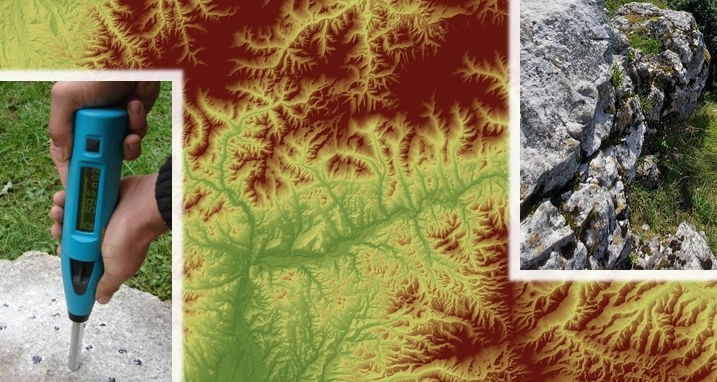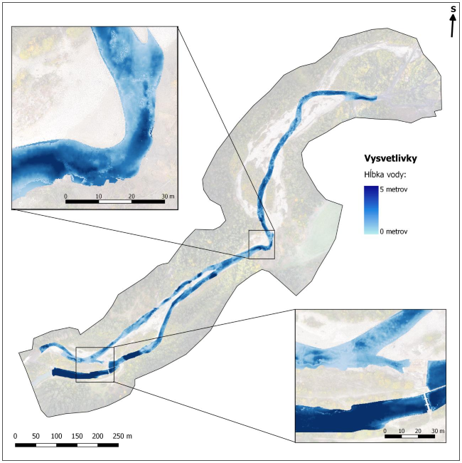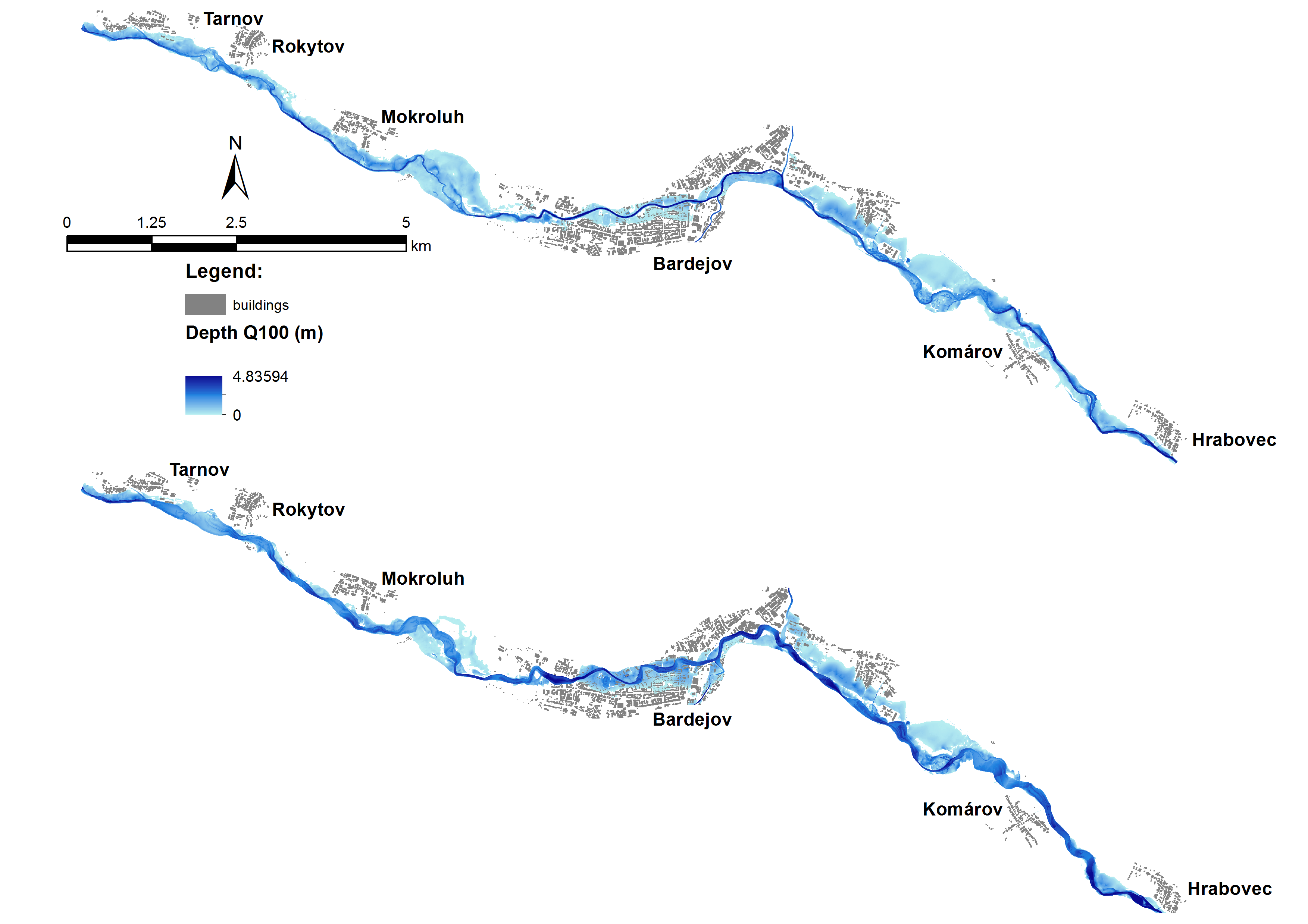Školiteľ: Ing. Anna Kidová, PhD.
Large woody debris (LWD) significantly influences flow regime, channel morphology, and processes in gravel-bed rivers. Consequently, LWD plays a signigicant role in sediment transport and in-channel landforms formation. Especially logjams accumulation create conditions for channel planform adjustment and support channel narrowing, increase flow depths and pool frequency. PhD thesis will determine the geomorphic controls that influence logjam deposition. In addition, we will assess how geomorphic characteristics (e.g., valley confinement, slope) may influence logjam deposition on avulsion channels in comparision to clumps accumulation on main channel. Very recent hydrological data will provide analysis concerning to size and duration of the maximum discharges where the individual sequences of logjams accumulation were proven. The high-resolution LiDAR with combination of UAV data for volume calculation as well as the 3D model of logjams creation will be used.
Supervisor: Ing. Anna Kidová, PhD.
A detailed reach scale model will be created by a set of field measurements and analyzes of data from remote sensing of river channel evolution will capture its significant geomorphological changes due to the operation of a small hydropower plant since 2000. The consequences of human interventions on river flows and artificial structures in river channels can determine negatively affect its natural development in the form of back-erosion processes, rapid channel incision into the bedrock, or complete loss of the ability of lateral migration of the river channel. It is therefore necessary to include approaches that provide objective scientific evidence for the application of appropriate river management practices when researching the development of an increasingly human-dominated landscapes.
Supervisor: Mgr. Ján Novotný, PhD.
Georelief is the result of the opposing action of endogenous and exogenous factors. In the current morphoclimatic conditions in the Western Carpathians, the dominant organizational element of georelief are river systems. Based on their properties, it is possible to identify manifestations of neotectonics, which is one of the main control factors in the development of georelief. However, in a tectonic active environment, it is necessary to distinguish the influence of tectonic processes from other factors, especially from the influence of heterogeneous lithology. Therefore, the aim of the work will be to perform a comprehensive geomorphological analysis of the selected area, to extract data from available digital relief models and other sources (geological maps) and to analyze differences in rock resistance in the field. The resulting synthesis will provide knowledge about the development of the studied area, with an emphasis on distinguishing the main factors that contributed to its formation.

Supervisor: Mgr. Ján Novotný, PhD.
The development of information technologies such as the use of artificial intelligence and deep learning models brings new opportunities for identifying natural hazards that directly threaten human life and health and cause economic losses. The aim of this thesis will be to use artificial intelligence tools (machine and deep learning) to analyse accurate, high-resolution digital elevation models and test the possibilities of automated slope deformation detection based on texture and morphological image analysis. A detailed statistical analysis will evaluate the suitability of using different combinations of input layers (derived from the elevation model) for identifying individual landslides using pixel-based and object-based classification methods. The work results in the development of a tool for mapping and monitoring these natural hazards.
Supervisor: Mgr. Róbert Pazúr, PhD.
The habitat loss and loss of ecological connectivity in increasingly fragmented human-dominated landscapes threatens the long-term persistence of many species. The moutainuous landscapes are a European hotspot of natural wildness. However, land-use changes such as infrastructure or settlement development, agricultural intensification, and forest harvesting put wildlife in the constant thread. This PhD aims to assess ecological connectivity and its changes based on sampled data and remote sensing data. The successful candidate will integrate telemetry data for species movement, remote sensing imagery and stakeholder knowledge into a powerful, spatially explicit connectivity assessment. A successful candidate should be fluent in English and passionate about wildlife and remote sensing. This PhD position offers a great way to join international research projects. A knowledge of the Slovak language is advantageous.
Supervisor: Mgr. Róbert Pazúr, PhD.
Agricultural land may be used by humans in different ways and intensities. This PhD aims to investigate the availabilities of remote sensing instruments and other spatial/statistical data to map the land use intensities over agricultural landscapes. You will explore the time series of Landsat and Sentinel-2 imagery, in combination with additional data (e.g., Copernicus spatial data platform, aerial imagery) to identify the evidence of the specific land-use types in agricultural landscapes (e.g., moving, grazing, plowing, fertilizing). A successful candidate should be fluent in English and capable of working in spatial analysis, remote sensing and data science. This PhD position offers a great way to join international research projects.
Supervisor: Mgr. Miloš Rusnák, PhD.
The aim is to classify the point cloud using machine and deep learning methods (AI) with a focus on vegetation. For vegetation detection, methods will be used to directly classify point clouds from LiDAR in the programming language Python using artificial intelligence methods in the TensorFlow libraries and training and test regions manually selected from measured point clouds. The work focuses on woody vegetation in riparian zones of watercourses with different classes of successional stages. A dynamic series of point cloud data will be used to understand the process of vegetation succession and to identify the spatiotemporal trajectories of vegetation at different successional stages (transition from succession to rejuvenation or stability). This PhD position offers a great opportunity to get involved in ongoing research projects.

Supervisor: Mgr. Miloš Rusnák, PhD.
The aim of this work is to identify morphological processes in the river channel, such as erosion and accumulation, resulting from channel lateral migration. The natural process of vegetation change in the riparian zone is then the result of succession and rejuvenation, which are linked to new and altered geomorphological forms. These processes are closely linked to the initial geomorphological process. Vegetation and woody debris subsequently prevent increased erosion during small floods and stabilise individual geomorphological forms during the inter-flood period. They contribute to sediment accretion and are a source of nutrients, seeds and dead wood leading to stabilisation. The work is based on the processing of 3D drone data, which will be used to identify processes and changes in the river landscape. This PhD position offers a great opportunity to get involved in ongoing research projects.
Supervisor: Mgr. Miloš Rusnák, PhD.
The aim of the work is the creation and classification of a complex 3D model of the channel bed by processing drone data (SfM photogrammetry). The work is based on model building based on optical data obtained from drones and automatic classification of different types of landforms based on cloud geometry. The results will be validated by a field survey. The physical parameters of the channel will be extracted from detailed 3D models, from which channel bathymetry will be calculated, channel bed structure, gravel benches, and bed substrate below the water surface will be reconstructed, and individual habitats will subsequently be identified. This PhD position offers a great opportunity to get involved in ongoing research projects.

Supervisor: Mgr. Miloš Rusnák, PhD.
The aim of this work is to identify and map gravel bars of selected river channels using a handheld lidar scanner. Based on a dense point cloud, a virtual reality of the current state will be created, showing rare and threatened riverine ecosystems. Individual models from the terrestrial scanning will then be compared with each other on a temporal scale. Sediment volume and sediment grain size composition will be analysed based on the processing of the dense point cloud and its geometric properties. The thesis focuses on field data acquisition and its point cloud processing to analyse the correlation between vegetation and sedimentation on gravel bars. This PhD position offers a great opportunity to get involved in ongoing research projects.
Supervisor: Mgr. Miloš Rusnák, PhD.
The main task is the semi-automatic measurement of surface flow velocities of the entire river section at high resolution based on drone videos and imagery. The flow velocity pattern of the river surface was measured using the estimated camera pose from SfM, the reconstructed bathymetric point cloud and the co-registered video frames in combination with image velocimetry analysis. The final processing step comprised particle tracking velocimetry to measure the river surface velocity along the river reach. The result will be validated by field measurement of flow velocity. This PhD position offers a great opportunity to get involved in ongoing research projects.

Supervisor: Ing. Daniel Szatmári, PhD.
Models using geostationary satellite data to estimate surface solar radiation globally are instrumental to the wider adoption of solar electricity production and energy transition in general. The accuracy of such models, typically evaluated against point-based ground measurements, is a key property that has direct economic consequences for users of the data in the solar industry. With the advent of new generations of geostationary satellite instruments, the pixel size of visible spectrum images has gradually decreased from 3 km to 0.5 km while the temporal frequency dropped from 30 to 5 minutes. Moreover, the pixel size is poised to halve in the next decade. This brings the spatial basis of the model closer to the one of measurements, potentially improving the fit. However, the increased resolution presents significantly higher computation and storage costs. There are additional challenges, such as the need for precise georeference, cloud parallax and shadow effects, and resolution differences between visible and infrared channels. The dissertation aims to analyse the feasibility, benefits and pitfalls of solar radiation modelling at 1 km and finer resolutions. The candidate gets an opportunity to collaborate with a major solar data and solutions provider Solargis s.r.o., and work with experts with extensive expertise in the field including utilisation of data and processing infrastructure.
Supervisor: Doc. RNDr. Matej Vojtek, PhD.
Nature-based solutions represent sustainable solutions for mitigating flood risk and building a more resilient society, especially in the context of climate and land use/land cover changes. The aim of the dissertation thesis is to comprehensively assess flood risk, focusing on fluvial and pluvial floods, which are the most common types of floods in Slovakia, and to determine how the proposed blue/green or hybrid nature-based solutions can affect flood risk. Flood risk will be assessed in terms of its two basic components: hazard and vulnerability. The use of detailed spatial data, rainfall-runoff, hydraulic, and scenario modelling, as well as geo-information technologies is assumed in the thesis.
Supervisor: Mgr. Daniel Michniak, PhD.
Uneven spatial development leads to the polarisation of space and the creation of peripheral and less developed regions. The aim of the dissertation will be to identify the factors influencing the formation of peripheral regions in Slovakia and to point out the possibilities of development of selected peripheral and economically lagging regions. The dissertation will focus on the endogenous and exogenous factors of development of peripheral regions.
Supervisor: Mgr. Daniel Michniak, PhD.
The character of the state border influences the development of the regions in its vicinity. On the one hand, the border can be a barrier or, on the other hand, an impulse for the development of border regions. The development of cross-border transport is one of the factors that point to the development of cross-border links and the integration of cross-border regions. The aim of this dissertation will be to analyse the changes in transport in selected regions. The dissertation will focus on the development of cross-border transport infrastructure after 1989 and the analysis of changes in public transport.
Supervisor: Mgr. Róbert Pazúr, PhD.
The goal of this PhD project is to assess the current ecosystem services of the national parks in Slovakia, trade-offs of their different future development and its hinterland, and their implementation into strategic planning. The successful candidate will integrate landscape ecology, remote sensing, and social sciences to provide a scientifically sound baseline about the different pathways of landscape development. A good knowledge of the Slovak language is advantageous.
Supervisor: Mgr. Róbert Pazúr, PhD.
Land-use change is caused by multiple drivers acting on multiple scales. While some causes of land change may be identified on the local scale, others may act on the regional or continental level. Additionally, land change often results from telecoupling between distant socio-ecological systems. The goal of this PhD is to identify the drivers of land change in a selected region with a specific focus on agriculture. A successful candidate should be fluent in English and has a passion for land-use modelling, remote sensing, and exploring the causalities of processes shaping the landscape. This PhD position offers a great way to join international research projects.
Supervisor: Mgr. Róbert Pazúr, PhD.
Same as in past decades, the future landscape in Europe will need to adapt to current natural and societal challenges (climate change, urbanisation pressure, demography). This PhD aims to develop the scenarios of plausible pathways of the future development of land-use and ecosystem services in selected areas of Europe. Core data used would be the land cover data, natural and socioeconomic statistics and outcomes of stakeholder workshops. A successful candidate should be fluent in English and has a passion for land-use modelling, modelling of ecosystem services, and exploring the causalities of processes shaping the landscape. This PhD position offers a great way to join international research projects and practical integration of research findings.
Supervisor: Mgr. Martin Šveda, PhD.
Mobile network data hold a distinctive position among emerging data sources that can enhance our understanding of contemporary trends and phenomena in human behaviour. Mobile phones have become an integral part of daily life and a unique source of information about population distribution, mobility, and activities. The idea of leveraging such data for spatial analyses emerged alongside the mass development of GSM-based mobile communication. However, it is only in the past decade that this research domain has witnessed substantial growth. The aim of this study is to examine current trends in the processing of these unique data and to propose an original methodology for investigating a selected spatial phenomenon, such as commuting, spatiotemporal behavior patterns, or the rhythms of locations.




